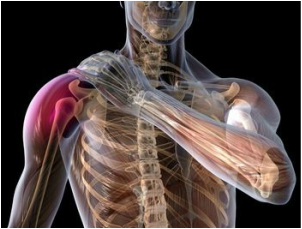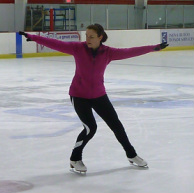 "Don't go to the doctor!" But the shoulder pain has become unbearable. "Just don't go to the doctor!" my skating coach insisted again. I always know he has my best interests in mind. "Why not?" I asked. "Because he will just tell you to stop skating." "Well what if he's right? I have to feel better. It's just too much now." "He's not right. Pain is just part of life now. You are older, you will have pain. You can still skate." Whoa, he played the age card. No fair. Still, I know I have endured numerous minor aches and pains regularly for years, figuring they will likely be with me for the remainder of my "older" adult life. But this pain has become unbearable. It wakes me in the middle of the night, begging for attention. I have invented a hundred "workarounds" to help me dress, open the car door, put my hair up, even hug my kids without pain. I decided to ignore my coach's pleas, and made an appointment with renowned shoulder expert, Dr. B. After a series of x-rays and an office visit filled with excruciating movement study ("do you have pain when I do this?"), my diagnosis was shoulder impingement and rotator cuff tendonitis. Basically a ton of inflammation and parts rubbing rudely against other parts that have no business being rubbed. His prescription for now is anti-inflammatories and some physical therapy. Day 2 and so far not much has changed, pain-wise. I will start the physical therapy on Monday, which will be Day 6, so hopefully the meds will enable me to do some exercises with much less pain. OK so that is the back story. Now for the lesson. It's a lesson for me. It's my job, my passion, to help injured athletes successfully navigate the sport injury rehabilitation process and come out confident and ready to return to play. All the knowledge in the world does not compare to knowledge plus experience. I am ready to experience, ready to practice what I so fervently preach. Thought I would share with you as I go. It's not going to be easy, as you can see from my coach's reaction. In the past, I have had sports injuries. Of course I have. Any athlete can point to any number of dings, sprains or breaks they have had. When training for the Marine Corps Marathon one year, my spirit was willing, but my achilles was weak. Had I continued to train it would surely have ruptured. I endured rehab and came back, though I did miss the marathon. Poor timing. So I have past experience to tell me that I will get through this, I will return. At that time, however, I did not yet know about the mental tools I could have used to help me. I struggled instead of taking control and thus did not fully regain confidence in my ability to run long distance. Another difference between then and now was that I was an individual, training on my own and not with a coach or team. I did not need to please anyone with my progress but myself. There was no timetable beyond my control for my return. Now, I have a coach. And the pressure he exerts is far more than I imagined it would be. It's not like I am training for the Olympics, but I must say I have made significant progress in my skating this year, and who knows what the future holds. To my coach, though, Olympian or not, train through the pain is the mantra. Granted, Dr. B did not specifically say "don't skate." He did say quite obviously, "If something you're doing when you skate causes pain, it might be a good idea not to do it for a few weeks to let the medication and therapy do their job." Like many of my clients who hear these words or face the cessation, albeit temporary, of a loved activity so integrated with life, I immediately began to figure a workaround. I can still skate, sure, but I just won't use that arm. Sure, that will affect my balance, my ability to use my shoulders to guide my turns and edges. But is that so bad? Practice what I preach. I need to do this right, if for no other reason than to prove to my clients I get it. And that the tools we use during their rehab do indeed work. So here I go. Even though my injury was not due to a trauma but was gradual in onset, there still came the moment when I knew enough was enough. Yet I was still unprepared to consider taking a break from skating. I did not understand exactly what was happening to my shoulder. There was a feeling that my shoulder was betraying me. As athletes we are very in tune with our bodies. We know how they move, know how to direct them to perform. We know what feels right and what feels wrong. We have the sense that we are in control of our bodies. So when an injury occurs, we may feel we are losing control over our bodies. So first things first, I set out to understand from Dr. B what exactly was happening without me. He is an amazing doctor, very patient and knowledgeable. He showed me a model of a shoulder, demonstrated over and over what was going on in my shoulder, and what needs to happen in order for the pain to go away. I plan to take this information into the next phase, when imagery will really come in handy.
1 Comment
Did you catch the NHL All-Star weekend festivities? I loved it all. Not just because I am a huge fan of hockey, but because I am also a fan of the human spirit. Sure, there were some amazing examples of just why these guys are masters at their craft. I certainly would never volunteer to stand in front of a Shea Weber slapshot no matter how much padding I had on. And Evgeny Kuznetzov, the Wizard of Washington, is a delight to watch as he snakes around and through crowds to put an exclamation point on an impossible pass.
I was more interested, though, in the personal stories that emerged from this year's celebration. The most obvious was that of John Scott, underdog fan favorite who, despite urging the fans to "vote for my teammates," won a place on the coveted roster. Within two weeks of that news, he got word he was being traded from Arizona to Montreal. Montreal immediately sent him down to the minors. No stranger to such abrupt changes, Scott handled it like a true professional. The NHL, however, was conflicted. How could he compete at the All-Stars now, and as a team captain, no less? In the end, Scott was allowed to join in. He not only joined, he shined. He scored two goals and emerged as MVP of the game. Fans adored him, even his fellow all-stars cheered and encouraged him. They hoisted his huge frame (about 7' tall on skates) on their shoulders, as he beamed. If you're interested in Scott's account of events leading up to the game, read the article he wrote for the Players Tribune, "A Guy Like Me." It's both touching and inspiring. Young fans everywhere should take notice of the sportsmanship on display. The fact that all of these egos were able to play nice together is encouraging. One player remarked when asked about the $1 million prize for the winning team, "I don't think any of the guys are playing for the money. It's a pride thing." I can believe that; surely none of these guys are hurting for pocket change. Pride is a powerful motivator. To be a superstar, you must take pride in all you do, in the way you prepare, the effort you give in practice, the devotion to the game and to your teammates. Pride allows you to be confident you are performing at your best at all times. You won't allow yourself anything less. John Scott should feel proud of how he handled himself. He was rewarded for his humility, his effort and determination to prove that he deserved to play alongside the best in the league. Even if only for the weekend. But for now, that is all that mattered. |
"Even if you are on the right track, you will get run over if you just sit there." Personal Best SportsThe sports world is filled with stories of perseverance, failure and success, personal struggles and public triumph. Each story provides insight into the mental side of sport and activity. Archives
March 2016
Categories
All
|

